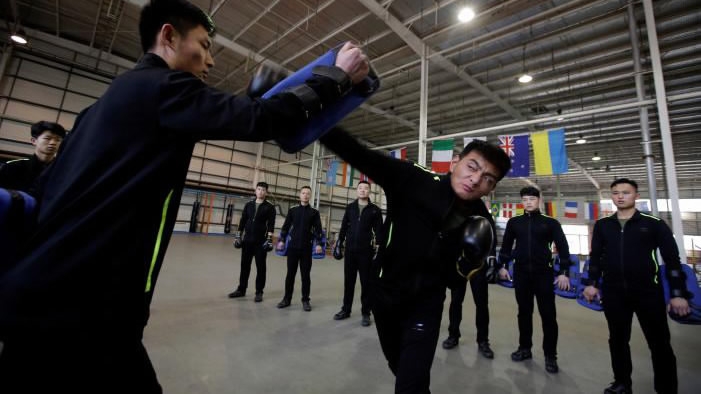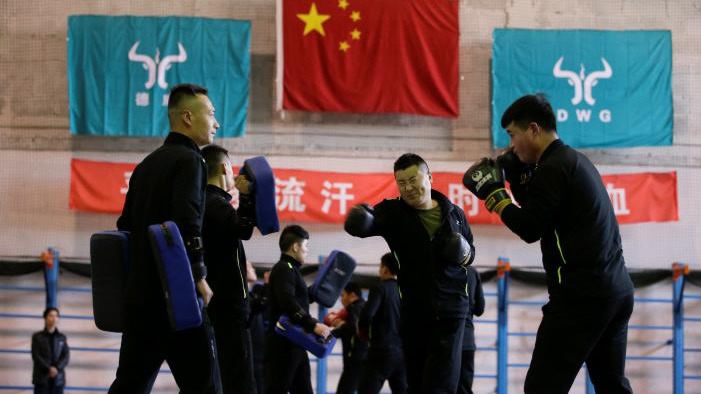Chinese security companies and their global rivals are jostling for business to protect thousands of Chinese workers - and the pipelines, roads, railways and power plants they build - as they fan out across the world under the Belt and Road Initiative.
Official statistics reveal that 350 security incidents occurred between 2010-2015 involving Chinese firms abroad. Some Chinese experts have said companies operating overseas are now beginning to think more about the importance of safety and security.

Trainees from Dewei Security attend boxing training at a camp on the outskirts of Beijing, March 2, 2017. /Reuters Photo
Security companies usually work with and train local staff, focusing on logistics and planning.
The Belt and Road Initiative brings such workers a lifetime work opportunity, said John Jiang, managing director of the Chinese Overseas Security Group (COSG), a newly-established consortium of security providers.
The COSG operates in six countries: Pakistan, Turkey, Mozambique, Cambodia, Malaysia and Thailand. In Pakistan, for example, COSG has a joint venture with a local security firm with links to Pakistan's navy.
The Pakistani army also plans to provide 14-15,000 armed personnel dedicated to guarding Chinese projects, according to local media reports.

Trainees from Dewei Security attend boxing training at a camp on the outskirts of Beijing, March 2, 2017. /Reuters Photo
Major international security operators hope their size and experience can convince China's state-owned giants to pay for foreign expertise.
Firms like Control Risks and G4S offer staff with military backgrounds and decades of experience in risky regions around the world.
G4S said it had seen an acceleration of interest in its services since the Belt and Road Initiative began gaining traction.
Michael Humphreys, a Shanghai-based partner at Control Risks, said around a third of the security consultancy's work in China was related to the Belt and Road Initiative.
Hong Kong-based logistics firm Frontier Services Group, co-founded by Erik Prince who created the US military security services business Blackwater, announced in December it was shifting strategy to capitalize on the Belt and Road Initiative.
It plans to set up an office in the southwestern province of Yunnan, which adjoins Southeast Asia, and another base in Xinjiang in China's northwest, the starting point for the China Pakistan Economic Corridor (CPEC) project.
Smaller Chinese firms like COSG, Shanghai-based Weldon Security and Dewei Security, meanwhile, see their advantage over multinationals in state-owned enterprises' preference for hiring Chinese staff to handle sensitive projects.
Only a handful of the estimated 5,800 Chinese security companies operate overseas, with the vast majority focusing on the domestic market.
"For Chinese firms, especially with security work, they (state companies) want to speak with another Chinese person. We can also one hundred percent reflect their thinking when we work," said Dewei general manager Hao Gang.
Yu Xuezhao, a former soldier working in Kenya for Dewei, is helping to train hundreds of local guards to protect Chinese contractors operating there, including oil giant Sinopec and China Road and Bridge.
"The most common incidents we encounter are thefts and strikes," 27-year-old Yu said, speaking from a training compound in the Kenyan capital Nairobi he has managed since 2015. "We train security guards to inspect cars and do ground patrols."
"A lot of the larger state-owned enterprises have only just started to go out in the last few years. As such, overseas security work remains a blank space for those firms who had not gone out before," he said.
(Source: Agencies)









